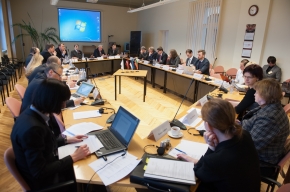 Galerie
Galerie
On Friday, 8 February, at the meeting of the Economics, Energy and Innovation Committee of the Baltic Assembly (BA), while discussing ways to strengthen economic cooperation among the Baltic States, members of the BA and representatives from the business community agreed unanimously that the business environment can be improved and economic growth can be facilitated by harmonising the national legal frameworks, uniformly transposing EU directives, implementing stable common policies on taxation and industry and developing joint infrastructure projects in the Baltic States.
“The Baltic States are too small to compete individually for investments and export markets. In a globalised market economy, we have to join our efforts in conquering export markets and launching investment development projects by applying for EU-funded projects; we also have to improve the investment climate in the Baltics by developing infrastructure and the transport sector,” stressed Raimonds Vējonis, President of the BA.
In order to improve cooperation among Baltic entrepreneurs, Vējonis called on representatives from the business community to establish a Coordination Council of Baltic Trilateral Foreign Economic Cooperation Policy. He stressed the need to jointly develop medical tourism in the Baltic States. Vējonis also emphasised that creation of a Baltic digital market had already been mentioned at the Baltic Council meeting and that our countries have to eliminate all obstacles which hinder creation of this market.
Linas Balsys, Lithuanian MP, arguing against the assumption that Baltic entrepreneurs are only competitors, expressed his opinion that the Baltic States are not taking full advantage of the opportunity to jointly represent the region’s interests in the EU. “A crucial problem is the insufficient number of people who could represent the interests of our states in various lobbying platforms; therefore, our voices are not sufficiently heard in comparison to those of other countries,” said Atis Lejiņš, Committee Chairman. Lejiņš also pointed out that this year the EU’s budget will decrease, and thus it is necessary to consider how to maintain economic growth in circumstances of reduced EU co-financing.
Lejiņš raised the issue of varying tax policies in the Baltic States. Participants of the discussion agreed that the business environment should be stable. Ramūnas Petravičius, representing the Lithuanian Business Confederation, stressed that tax rates ought to be kept as stable as possible so that investors can be sure that taxes will not change with each new convocation of parliament. He also added that bureaucratic obstacles should be eliminated. Vējonis also noted that the Baltic Assembly supports the harmonising of tax policies in all Baltic States.
When discussing attracting investments to the region, Petravičius stressed that foreign direct investments will enable our countries to catch up with the most developed EU member states, to create more jobs and raise salaries. Nevertheless, priority should be given to manufacturing high-added-value products. Tõnis Arro, Chairman of the Estonian Development Fund, also pointed out that establishing and developing our own innovative enterprises is even more important than attracting foreign investments and registering foreign enterprises in the Baltic States. As a positive example, Arro mentioned cooperation between Estonia and Sweden in creating Skype.
Participants of the meeting also stressed the importance of the ease of doing business index. Jānis Volberts, representative from the Investment and Development Agency of Latvia, emphasised that the ranking of the entire Baltic region on this index is crucial. Inese Stepiņa, representing the Employers' Confederation of Latvia, pointed out that some indicators for the Baltic States differ by up to three times, a fact which demonstrates a significant degree of social and economic inequality among our three countries.
When focusing on the results attained so far in cooperating to facilitate economic growth, Vējonis praised the joint achievements of the Baltic States in overcoming the economic crisis. Arro highlighted the Baltic Investment Fund, which offers five investment funds to entrepreneurs that want to locate their businesses in the Baltic States.
During the meeting, Daniels Pavļuts, Latvian Minister for Economics, reported to the Committee on the implementation of joint projects on biomass and biogas energy production in the Baltic States. The participants acknowledged the need to work together in reducing the cost of electricity in the Baltic States. Pavļuts drew attention to the fact that EU legislative acts on renewable energy resources set forth a number of support schemes that the Baltic States have not used yet. The Minister said that in order to successfully implement joint renewable energy projects such as construction of cogeneration facilities, it is necessary to have uniform, clear and useful support schemes for energy suppliers.
Saeima Press Service







